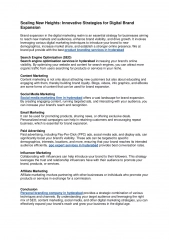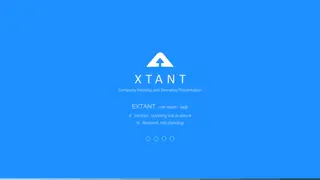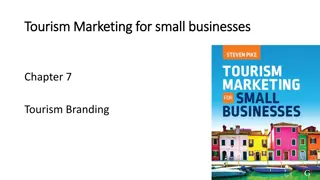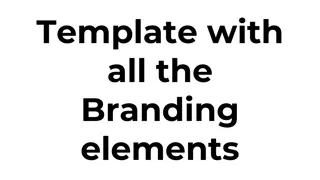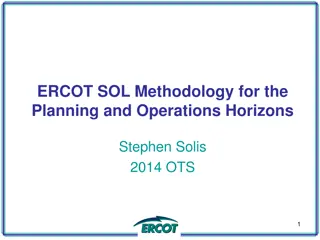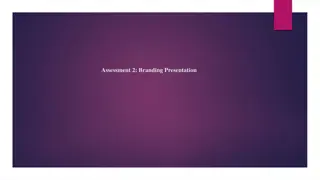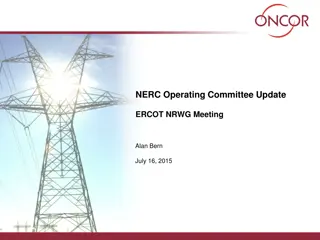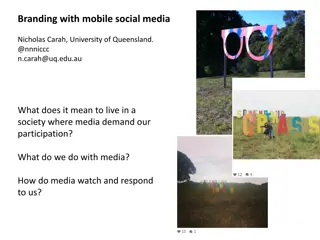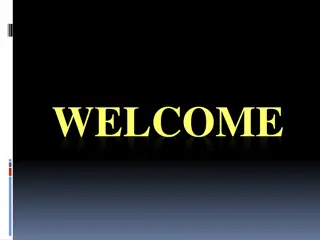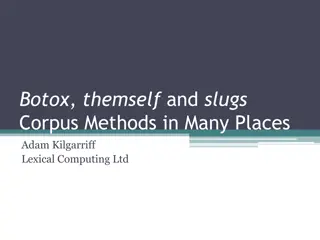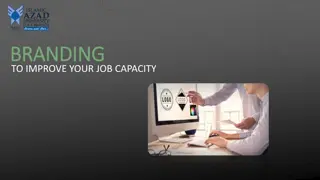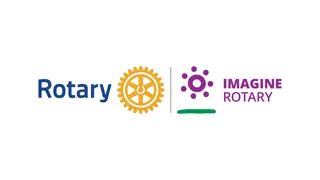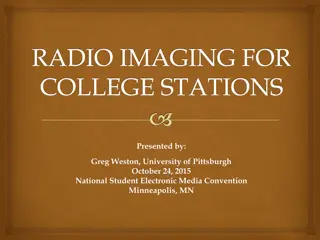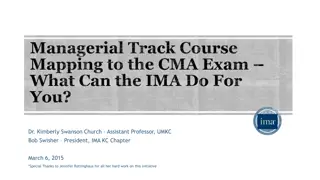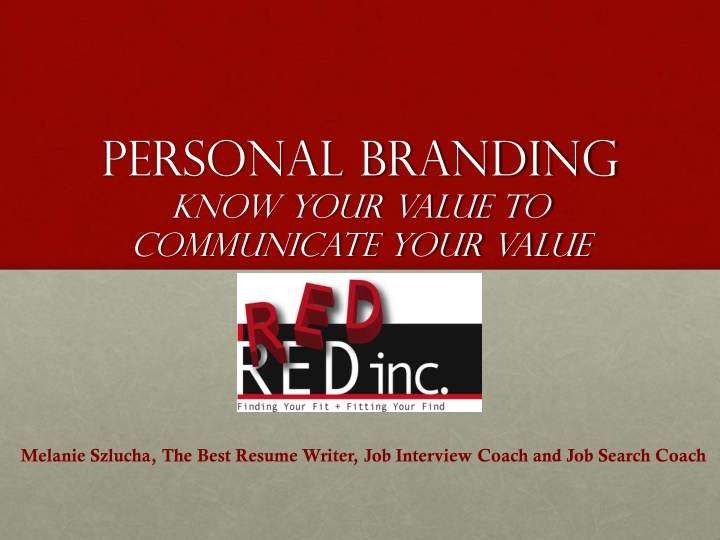
Unleashing Your Unique Brand: Key Steps to Identify and Communicate Your Value
Discover the essence of personal branding through identifying and articulating your unique value with expert tips from Melanie Szlucha, a renowned resume writer and job search coach. Learn how to control your message, present yourself consistently, and leverage your skills and experiences to create a memorable brand that attracts opportunities. Transition your skills effectively to job searches and explore the importance of branding in today's competitive market.
Download Presentation

Please find below an Image/Link to download the presentation.
The content on the website is provided AS IS for your information and personal use only. It may not be sold, licensed, or shared on other websites without obtaining consent from the author. If you encounter any issues during the download, it is possible that the publisher has removed the file from their server.
You are allowed to download the files provided on this website for personal or commercial use, subject to the condition that they are used lawfully. All files are the property of their respective owners.
The content on the website is provided AS IS for your information and personal use only. It may not be sold, licensed, or shared on other websites without obtaining consent from the author.
E N D
Presentation Transcript
Personal Branding Know your Value to Communicate Your Value Melanie Szlucha, The Best Resume Writer, Job Interview Coach and Job Search Coach
What is a Brand? Put simply, a brand is the association of positive (or negative) qualities with a recognizable name.
Different Brands Evoke Different impressions
Why Should You Care About Your Brand? 1. You need to control the message and articulate your value. 2. You need to present yourself consistently. 3. Helps you describe your experiences more clearly.
What Goes Into Your Brand? Image Skills
Using Others to Identify Your Skills 1. Performance Reviews and LinkedIn Recommendations. What have your bosses said about your skills? How did your favorite boss describe you? 2. Attributes that colleagues and friends use to describe you. If I called them, what would they say? What are you known for?
Looking At Your Experiences to Identify Skills 1. Accomplishments. What are the things you have worked to achieve? 2. What did you enjoy about your last job, or what was your favorite job and why? 3. What is the essence of what you enjoy doing? 4. What are problems you are good at solving? 5. Themes in your career or volunteer experiences. Are you the person who is always What are you known for?
Looking at Your experiences to Identify Skills GOAL: Gather a list of unique traits that not everyone possesses, but are attractive to employers. That becomes your brand. It enables you to discuss your experience with passion in a networking situation or job interview (to be memorable). Describe your background in the summary section of LinkedIn (to entice employers/recruiters to reach out to you). Brand yourself boldly at the top of your resume.
Transitioning Skills to Jobs 1. Search the job boards (advanced search feature) using those skill words. Indeed.com, LinkUp.com, ZipRecruiter 2. Search using your degree or certification credentials. You may be surprised to see what other types of positions are interested in your degrees. 3. Informational interviews at potential companies or people who are currently holding that job. Don t trust a career coach. We re not on the front lines and in the hiring trenches. Go to the horse s mouth to understand their underlying concerns and start there.
m a k e a r e s u m e H o w t o Avoid functional resumes like this one.
m a k e a r e s u m e H o w t o A Chronological, skill-based resume is a safer bet.
Image and your Brand Your image is all of those personal characteristics that people use as indicators to get a sense of who you are. How you dress. Your email style. Phone and voicemail etiquette. How proactive, self-reliant, tenacious or helpful you are. How you show up for appointments. Your resume style. And lastly . Beware the Halo effect.
Improv and Job Interviews The foundation of improv is listening and agreeing. Listening: Not only with your ears, but also being attune to the physical nuances of the scene partner. In today s society, this is a lost art. We rarely concentrate our attention on the other person to that degree, and as a result, we miss opportunities to connect with them because we are so concerned about sharing our message.
Improv Exercises Alphabet Game: 1. Partners of 2. 2. Each sentence starts with successive letters of the alphabet. Apples are on sale today. Brad, you know I m allergic, why do you do this to me? Carl, I wouldn t define an allergy as an itchy nose . Etc. 3. 2 minutes for this exercise. Try to make it a conversation that makes sense. See how far through the alphabet you can get. 4. Suggestion: You re 2 friends walking around a mall.
Improv Exercises One Word Story: 1. Partners of 2. 2. Each person is contributing one word to create a story that makes sense. 3. 2 minutes for this exercise. 4. Suggestion: Create a fairy tale/adventure story.
Putting it All together Don t expect the employer to figure it out on their own. Branding helps to make sure you get into the right position versus a position that may not be a fit. Branding defines your value and what an employer can expect to get from you based on your experience and skills. You want to control the conversation and articulate your value. Be aware that everything you do is contributing to your brand. Listening will give you more clues about how to position yourself for the position in an interview.



